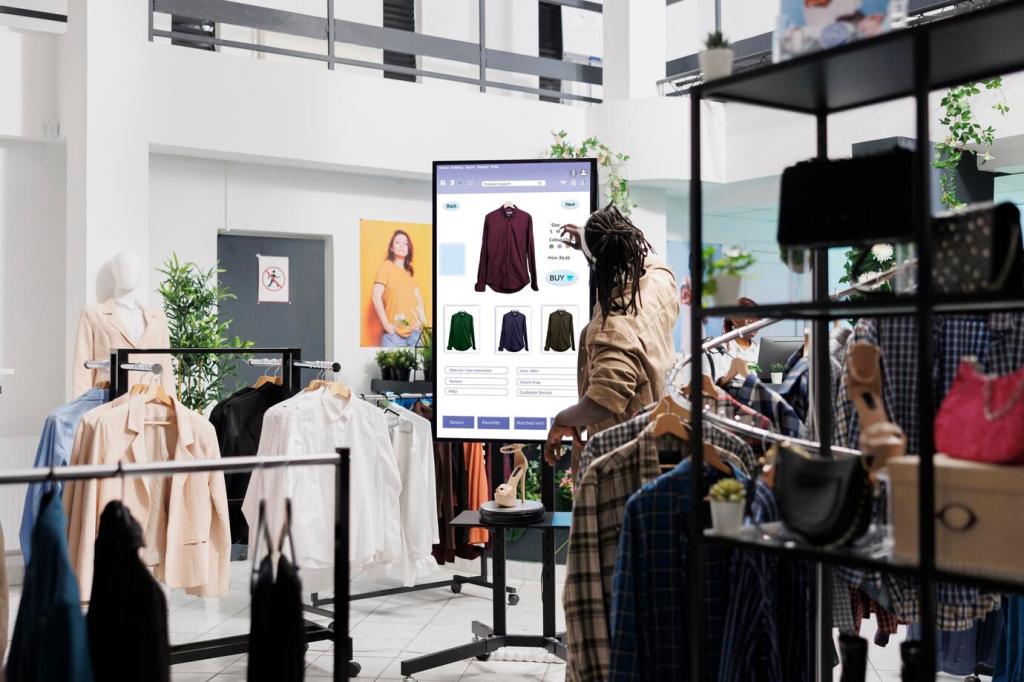The modern retail landscape is rapidly evolving, driven by changing consumer behaviors and technological advancements. Artificial intelligence (AI) is at the forefront of this transformation, offering retailers a powerful toolkit to streamline operations, improve efficiency, and deliver personalized experiences. By leveraging AI, businesses can optimize everything from inventory management to customer engagement, creating a seamless and data-driven retail ecosystem. This page explores the most impactful AI strategies for retail operations, detailing the opportunities and approaches that can set forward-thinking retailers apart in a competitive market.
Previous
Next
Personalized Customer Experiences
Data-Driven Recommendation Engines
Recommendation engines powered by AI examine customer browsing history, purchase behavior, and preferences to suggest relevant products. These intelligent suggestions not only increase basket size but also create a more engaging shopping experience, encouraging customers to explore unfamiliar product categories and boosting overall sales.
Personalized Marketing and Promotions
AI systems segment customers based on demographics, past behaviors, and predicted future actions. This allows retailers to deliver targeted promotions and communications that resonate with individual shoppers. Personalized campaigns increase engagement, minimize marketing waste, and drive higher redemption rates compared to generic mass marketing approaches.
Real-Time Customer Engagement
With AI-driven chatbots and virtual assistants, retailers can engage customers instantly across various channels. These tools help answer queries, provide product recommendations, and assist with order tracking—delivering convenience and support that drives satisfaction and repeat business, while also gathering valuable data to further hone personalization strategies.

AI analyzes variables such as traffic, weather, and delivery schedules to create optimal distribution routes. By anticipating potential delays and adjusting logistics accordingly, retailers can ensure timely deliveries, reduce transport costs, and enhance the reliability of their supply chains, delighting both stores and customers.

Tracking and improving supplier reliability is essential for operational success. AI systems evaluate supplier performance across metrics like delivery punctuality, product quality, and compliance with agreements. Insights from this analysis support better negotiation, stronger partnerships, and more resilient supply networks.

Unexpected changes in demand or supply can disrupt operations. AI dynamically balances these variables by constantly analyzing inventory levels, sales trends, and external factors. Automated adjustments—such as reallocating stock between locations or spotting alternative suppliers—help retailers maintain optimal stock levels and avoid lost sales.
Smart Shelving and Checkout Systems
Smart shelving uses sensors and AI to track real-time product availability. When combined with automated checkout technologies, these systems eliminate long lines and out-of-stock disappointments. Customers enjoy a frictionless experience, while retailers gain accurate, real-time inventory insights and improved loss prevention.
In-Store Behavior Analytics
Understanding how customers move and interact within stores is crucial for improving layouts and product placements. AI-powered cameras and sensors analyze traffic flows, dwell times, and engagement with displays. Actionable insights help retailers redesign store environments to maximize both sales and customer satisfaction.
Interactive Shopping Assistants
Interactive kiosks or mobile apps powered by AI can assist shoppers in finding products, receiving personalized recommendations, and accessing promotional information. These tools enhance the in-store journey, making it more convenient, informative, and enjoyable for every customer.
Dynamic Price Adjustment
AI continuously analyzes market data, competitor prices, and product demand to suggest optimal pricing. This allows retailers to react rapidly to changes, such as increasing prices for high-demand items or offering discounts to clear slow-moving stock, maximizing revenue without alienating customers.
Competitor Price Monitoring
Manual competitor monitoring is time-consuming and prone to lag. AI tools autonomously track price changes across competing retailers, alerting decision-makers in real time. Insights can inform instant adjustments to stay competitive, protect market share, and maintain profitability, all without relying on delayed manual processes.
Personalized Pricing Offers
By leveraging customer data, AI makes it possible to offer tailored discounts or pricing to individuals, rewarding loyalty or incentivizing purchases. This strategy encourages repeat shopping and upselling, while ensuring that the overall pricing structure supports both sales and margin goals.
Previous slide
Next slide
Advanced Fraud Detection and Security
Real-Time Transaction Monitoring
AI systems analyze transactions as they occur, flagging suspicious patterns such as unusual spending, rapid-fire purchases, or inconsistencies in customer data. This immediate detection enables swift intervention, preventing losses and maintaining trust in digital and in-store payment processes.
Data Security and Privacy Compliance
With mounting data privacy regulations and risks, AI assists in ensuring that customer information is securely stored, accessed, and shared. Automated compliance checks and threat detection help retailers maintain robust defenses, manage vulnerabilities, and respond rapidly to potential breaches.
Loss Prevention Intelligence
Beyond payments, AI integrates data from cameras, RFID tags, and sensors to recognize potentially fraudulent behaviors or internal theft. These intelligent surveillance systems learn from past incidents, becoming more adept at identifying risks and empowering loss prevention teams to act before major losses occur.

